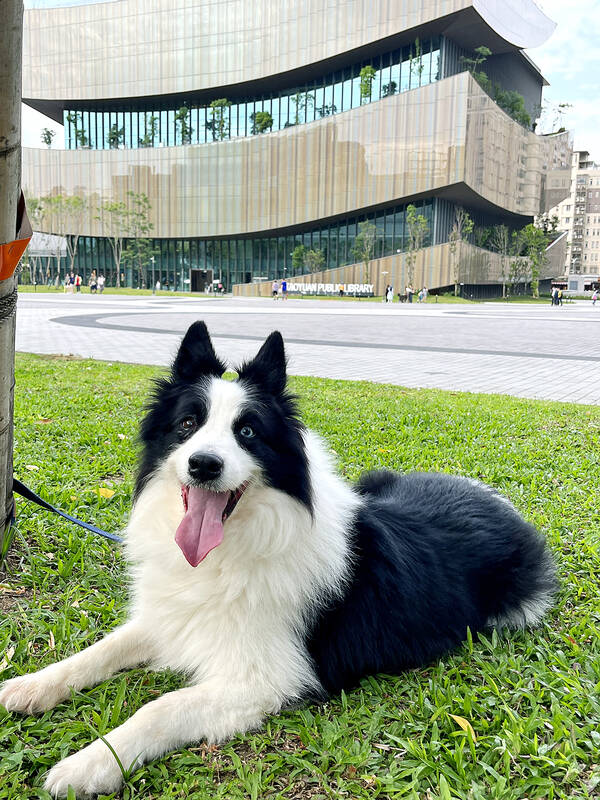The Bureau of Animal and Plant Health Inspection and Quarantine is working on measures that include allowing pet cat or dog importers to conditionally waive the mandated quarantine period.
The measures are in response to the increasing demand for imported pets and requests for a more flexible quarantine policy while minimizing risks of importing rabies, bureau Deputy Director-General Hsu Jung-pin (徐榮彬) said yesterday, adding that they could be implemented in the latter half of this month.
The nation in 2021 had 87,810 registered house cats and 1.23 million house dogs, Hsu said, citing the bureau’s statistics.

Photo: CNA
The bureau has proposed amendments to Addendum 6, Article 8 of the Regulations for the Importation of Objects Subject to Animal Quarantine (輸入應施檢疫物檢疫準則), with the bureau designating three types of risk management measures and pet importers being allowed to apply for a quarantine waiver if they meet one of the requirements.
One, importers must apply for a quarantine waiver 120 days before the pet’s arrival. The other two applies to people applying for an import permit 20 days before the animal’s arrival: importers must present quarantine examination reports from the country of origin; or, testing facilities from the country of origin can send quarantine exam results directly to the target destination.
However, the prerequisite for these three measures is a blood test showing that the cat or dog had received a rabies shot 180 days before an application for waiver is filed, Hsu said.
Rabies has an incubation period of 180 days.
Current regulations stipulate that to import canines and felines from regions with known rabies infections, importers must present documentation that the animals had been vaccinated 90 days before their scheduled date of arrival, Hsu said.
Japan, Singapore, Australia, New Zealand, Estonia, the UK, Iceland, Sweden, Norway, the Svalbard Islands, Hawai and Guam are the only countries or areas without known cases of rabies infections.
Importers must also apply for an import permit 20 days before the animal’s arrival, Hsu said, adding that the animal must be quarantined for seven days after arrival.
Cats and dogs imported from Japan would only need to present official documents prior to their arrival in Taiwan, he said.

Temperatures in northern Taiwan are forecast to reach as high as 30°C today, as an ongoing northeasterly seasonal wind system weakens, the Central Weather Administration (CWA) said. CWA forecaster Tseng Chao-cheng (曾昭誠) said yesterday that with the seasonal wind system weakening, warmer easterly winds would boost the temperature today. Daytime temperatures in northern Taiwan and Yilan County are expected to range from 28°C to 30°C today, up about 3°C from yesterday, Tseng said. According to the CWA, temperature highs in central and southern Taiwan could stay stable. However, the weather is expected to turn cooler starting tonight as the northeasterly wind system strengthens again

The Ministry of Foreign Affairs (MOFA) yesterday expressed “grave concerns” after Singaporean Prime Minister Lawrence Wong (黃循財) reiterated the city-state’s opposition to “Taiwanese independence” during a meeting with Chinese Premier Li Qiang (李強). In Singapore on Saturday, Wong and Li discussed cross-strait developments, the Singaporean Ministry of Foreign Affairs said in a statement. “Prime Minister Wong reiterated that Singapore has a clear and consistent ‘one China’ policy and is opposed to Taiwan independence,” it said. MOFA responded that it is an objective fact and a common understanding shared by many that the Republic of China (ROC) is an independent, sovereign nation, with world-leading

COOLING OFF: Temperatures are expected to fall to lows of about 20°C on Sunday and possibly 18°C to 19°C next week, following a wave of northeasterly winds on Friday The Central Weather Administration (CWA) on Sunday forecast more rain and cooler temperatures for northern Taiwan this week, with the mercury dropping to lows of 18°C, as another wave of northeasterly winds sweeps across the country. The current northeasterly winds would continue to affect Taiwan through today, with precipitation peaking today, bringing increased rainfall to windward areas, CWA forecaster Liu Pei-teng (劉沛滕) said. The weather system would weaken slightly tomorrow before another, stronger wave arrives on Friday, lasting into next week, Liu said. From yesterday to today, northern Taiwan can expect cool, wet weather, with lows of 22°C to 23°C in most areas,

DEFENDING FREEDOM: Taiwanese love peace and helping others, and hope to be a positive force in the world, Vice President Hsiao Bi-khim told ‘Weltspiegel’ Taiwan is making every effort to prevent war in the face of China’s hybrid coercion tactics and military threats, Vice President Hsiao Bi-khim (蕭美琴) said in an interview with German public broadcaster ARD’s program Weltspiegel that aired on Monday. Taiwan is not seeking provocation or intending to disrupt international order, but “must possess the capacity for self-defense,” a news release issued by the Presidential Office yesterday quoted her as saying. Taiwan is closely watching not only the increasing scope and frequency of Chinese military exercises around the nation, but also Beijing’s hybrid and cognitive warfare tactics, including manipulating public opinion, fostering